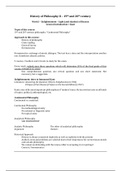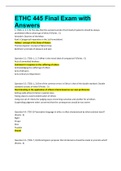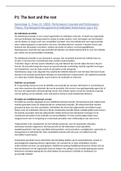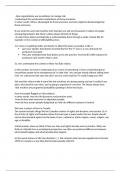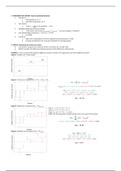History of Philosophy II – 19th and 20th century
Week I – Enlightenment – Light (and shadow) of Reason
General introduction + Kant
Topic of this course:
19th and 20th century philosophy: “Continental Philosophy”
Approach in this course:
﮲History of philosophy
﮲Close reading
﮲General Survey
﮲Hermeneutics
Hermeneutics: exchange of minds, dialogue. The text has a story and the interpretation another
one. Sometimes abused: politics.
9 courses, 9 authors and 14 texts to study for the exam.
Every week: submit your three questions which will determine 20% of the final grade of this
course. SUNDAYS AT 18:00
One comprehension question, one critical question and one short statement. Not
necessary, but a suggestion.
Enlightenment: intro to Immanuel Kant
Literature: Answering the Question: What is Enlightenment (1784)
Critique of Pure Reason (Preface to the Second Edition) (1787)
Kant is one of the most important philosophers of ‘modern’ times. He has written texts on all kinds
of topics: political, anthropological, etc.
Continental Philosophy
Continental vs. analytical.
Continental Philosophy
﮲No methodological unity
﮲No national or linguistic unity
﮲No topical unity
Analytical Philosophy
﮲SEE POWERPOINT
Analytic Philosophy The other of analytical philosophy
Argument rhetoric
Historical Approach
﮲History is always connected implicitly as well as explicitly with the present
﮲Authors, texts and problems are selected due to their importance for current issues inside
and outside philosophy
﮲We cannot avoid dealing with the canon, either in accepting it or rejecting it
﮲Context / hermeneutics
,Immanuel Kant (1)
Kant reacted to the theories of Hume.
Combine necessity of science, react to Hume: laws of nature, they are necessary. The laws always
function. Necessity & the moral law within. Freedom is the most important topic of enlightenment.
For Kant we are citizens of two worlds: world of nature and the world of human beings. God exists
according to Kant. No basis of religion needed to prove that we are free, God exists, but he is not
necessary for freedom.
Freedom
Ignorance and fanaticism were common in this times (end of 18th century).
﮲ French Revolution in 1789.
﮲ Enlightened Absolutism.
o Frederic the Great (1712-1786). Make the basic educational system available for
everyone. Idea of enlightenment to get to freedom.
﮲ Lisbon earthquake in 1755.
o Philosophers reacted to this natural catastrophe, because it made people think
about the progress in science, which made us strong, but we still can’t do anything
about nature.
Immanuel Kant (2)
His parents were pietists, which is Protestantism where the duty and feelings are more important
than the actual Bible/Christian belief. Kant was more interested in science than in philosophy. He
wanted to understand people like Newton.
There are three questions in which all interest of reason(speculative and practical) is united
1. What can I know?
2. What should I do?
3. What may I hope?
4. What is human being?
Not really question 4, because it is a combination of the three questions above: what can I know
as a human being? What should I do as a human being? What may I hope as a human being?
What can I know What should I do?
Fundamental laws of nature Fundamental principle of morality
Necessity Freedom to choose in accordance with the Moral Laws
Universality
Conflict between:
Necessity of nature vs. freedom of human being
We are free not to accept the universal laws of morality.
Critique of Pure Reason
Transcendental idealism
Fundamental laws of nature
Fundamental principle of morality
Prove the validity and the limits of an a priori knowledge.
In order to do things like art, you need limits. Drawing is limited by the size of the paper. Or you
have to finish something before a certain deadline.
, The idea of limits is connected with creating something. We are not immortal so we always have
at least one limit, namely the limit of time before we die.
What is freedom without limits? = an important question.
Definition: comes from ‘finish’. So definition of ‘table’ is explained by the limits of the table.
In Kant’s theory the limits are literal: what can I know?
How do we know something is true?
Critique of
﮲Skepticism
﮲Dogmatism
﮲Indifferentism
Skepticism
Hume on causality
﮲Constant and regular conjunction
﮲Correlation is not the same as causation
﮲No a priori connection, i.e. no necessary connection between cause and effect
Dogmatic or axiomatic starting point
Reason: Rationalism Perception: Empiricism
Descartes: Innate ideas Locke: Tabula Rasa
The mind is like an empty page
All knowledge comes from experience
Sense perception causes ideas
How can we justify the universal validity of (Newton’s) physics?
Copernical turn: change of perspective
For dogmatics it’s an arrow, not a turn.
Transcendental Idealism
Transcendental = that which can be known as a condition of the possibility of experience
=/= transcendent (surpassing the limits of experience)
Idealism = doubt that there are any objects other than minds and their representations
A kind of realism (it assumes that objects do exist independently of our perceptions)
Reading Questions on Kant
1. What is the distinction between public and private reason?
2. What is the difference between a “positive” and a “negative” use of the Critique of Pure
Reason?
3. Please compare these two different texts. Are there
Week II – German Idealism and the “Cunning of Reason”
Discussion Kant, intro Hegel
Immanuel Kant – Discussion
Copernican Revolution:
Our cognition must conform to objects → objects
must conform to our cognition
Empirical knowledge of Phenomena
Week I – Enlightenment – Light (and shadow) of Reason
General introduction + Kant
Topic of this course:
19th and 20th century philosophy: “Continental Philosophy”
Approach in this course:
﮲History of philosophy
﮲Close reading
﮲General Survey
﮲Hermeneutics
Hermeneutics: exchange of minds, dialogue. The text has a story and the interpretation another
one. Sometimes abused: politics.
9 courses, 9 authors and 14 texts to study for the exam.
Every week: submit your three questions which will determine 20% of the final grade of this
course. SUNDAYS AT 18:00
One comprehension question, one critical question and one short statement. Not
necessary, but a suggestion.
Enlightenment: intro to Immanuel Kant
Literature: Answering the Question: What is Enlightenment (1784)
Critique of Pure Reason (Preface to the Second Edition) (1787)
Kant is one of the most important philosophers of ‘modern’ times. He has written texts on all kinds
of topics: political, anthropological, etc.
Continental Philosophy
Continental vs. analytical.
Continental Philosophy
﮲No methodological unity
﮲No national or linguistic unity
﮲No topical unity
Analytical Philosophy
﮲SEE POWERPOINT
Analytic Philosophy The other of analytical philosophy
Argument rhetoric
Historical Approach
﮲History is always connected implicitly as well as explicitly with the present
﮲Authors, texts and problems are selected due to their importance for current issues inside
and outside philosophy
﮲We cannot avoid dealing with the canon, either in accepting it or rejecting it
﮲Context / hermeneutics
,Immanuel Kant (1)
Kant reacted to the theories of Hume.
Combine necessity of science, react to Hume: laws of nature, they are necessary. The laws always
function. Necessity & the moral law within. Freedom is the most important topic of enlightenment.
For Kant we are citizens of two worlds: world of nature and the world of human beings. God exists
according to Kant. No basis of religion needed to prove that we are free, God exists, but he is not
necessary for freedom.
Freedom
Ignorance and fanaticism were common in this times (end of 18th century).
﮲ French Revolution in 1789.
﮲ Enlightened Absolutism.
o Frederic the Great (1712-1786). Make the basic educational system available for
everyone. Idea of enlightenment to get to freedom.
﮲ Lisbon earthquake in 1755.
o Philosophers reacted to this natural catastrophe, because it made people think
about the progress in science, which made us strong, but we still can’t do anything
about nature.
Immanuel Kant (2)
His parents were pietists, which is Protestantism where the duty and feelings are more important
than the actual Bible/Christian belief. Kant was more interested in science than in philosophy. He
wanted to understand people like Newton.
There are three questions in which all interest of reason(speculative and practical) is united
1. What can I know?
2. What should I do?
3. What may I hope?
4. What is human being?
Not really question 4, because it is a combination of the three questions above: what can I know
as a human being? What should I do as a human being? What may I hope as a human being?
What can I know What should I do?
Fundamental laws of nature Fundamental principle of morality
Necessity Freedom to choose in accordance with the Moral Laws
Universality
Conflict between:
Necessity of nature vs. freedom of human being
We are free not to accept the universal laws of morality.
Critique of Pure Reason
Transcendental idealism
Fundamental laws of nature
Fundamental principle of morality
Prove the validity and the limits of an a priori knowledge.
In order to do things like art, you need limits. Drawing is limited by the size of the paper. Or you
have to finish something before a certain deadline.
, The idea of limits is connected with creating something. We are not immortal so we always have
at least one limit, namely the limit of time before we die.
What is freedom without limits? = an important question.
Definition: comes from ‘finish’. So definition of ‘table’ is explained by the limits of the table.
In Kant’s theory the limits are literal: what can I know?
How do we know something is true?
Critique of
﮲Skepticism
﮲Dogmatism
﮲Indifferentism
Skepticism
Hume on causality
﮲Constant and regular conjunction
﮲Correlation is not the same as causation
﮲No a priori connection, i.e. no necessary connection between cause and effect
Dogmatic or axiomatic starting point
Reason: Rationalism Perception: Empiricism
Descartes: Innate ideas Locke: Tabula Rasa
The mind is like an empty page
All knowledge comes from experience
Sense perception causes ideas
How can we justify the universal validity of (Newton’s) physics?
Copernical turn: change of perspective
For dogmatics it’s an arrow, not a turn.
Transcendental Idealism
Transcendental = that which can be known as a condition of the possibility of experience
=/= transcendent (surpassing the limits of experience)
Idealism = doubt that there are any objects other than minds and their representations
A kind of realism (it assumes that objects do exist independently of our perceptions)
Reading Questions on Kant
1. What is the distinction between public and private reason?
2. What is the difference between a “positive” and a “negative” use of the Critique of Pure
Reason?
3. Please compare these two different texts. Are there
Week II – German Idealism and the “Cunning of Reason”
Discussion Kant, intro Hegel
Immanuel Kant – Discussion
Copernican Revolution:
Our cognition must conform to objects → objects
must conform to our cognition
Empirical knowledge of Phenomena

